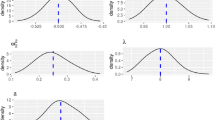Abstract
We consider an estimation problem of both drift and diffusion coefficient parameters for an ergodic diffusion process based on discrete observations. Hybrid multi-step estimators are proposed and their asymptotic properties, including convergence of moments, are obtained.


Similar content being viewed by others
References
Adams RA, Fournier JJF (2003) Sobolev spaces. Pure and applied mathematics (Amsterdam), vol 140, 2nd edn. Elsevier/Academic Press, Amsterdam
Bibby BM, Sørensen M (1995) Martingale estimating functions for discretely observed diffusion processes. Bernoulli 1:17–39
Brouste A, Fukasawa M, Hino H, Lacus S, Kamatani K, Koike Y, Masuda H, Nomura R, Shimuzu Y, Uchida M, Yoshida N (2014) The YUIMA project : a computational framework for simulation and inference of stochastic differential equations. J Stat Softw 57:1
Florens-Zmirou D (1989) Approximate discrete time schemes for statistics of diffusion processes. Statistics 20:547–557
Genon-Catalot V, Jacod J (1993) On the estimation of the diffusion coefficient for multidimensional diffusion processes. Ann Inst Henri Poincaré Probab Stat 29:119–151
Gobet E (2001) Local asymptotic mixed normality property for elliptic diffusion: a Malliavin calculus approach. Bernoulli 7:899–912
Gobet E (2002) LAN property for ergodic diffusions with discrete observations. Ann Inst H Poincaré Probab Stat 38:711–737
Ibragimov IA, Has’minskii RZ (1981) Statistical estimation. Springer Verlag, New York
Kamatani K (2014) Efficient strategy of Markov chain Monte Carlo method for high-dimensional heavy-tail distribution (in preparation)
Kessler M (1995) Estimation des paramètres d’une diffusion par des contrastes corrigés. C R Acad Sci Paris Ser I Math 320:359–362
Kessler M (1997) Estimation of an ergodic diffusion from discrete observations. Scand J Stat 24:211–229
Kutoyants YA (1984) Parameter estimation for stochastic processes. In: Prakasa Rao BLS (ed ) Heldermann, Berlin
Kutoyants YuA (2004) Statistical inference for ergodic diffusion processes. Springer-Verlag, London
Lehmann EL (1999) Elements of large-sample theory. Springer-Verlag, New York
Masuda H (2013a) Asymptotics for functionals of self-normalized residuals of discretely observed stochastic processes. Stoch Process Appl 123:2752–2778
Masuda H (2013b) Convergence of Gaussian quasi-likelihood random fields for ergodic Levy driven SDE observed at high frequency. Ann Stat 41:1593–1641
Prakasa Rao BLS (1983) Asymptotic theory for nonlinear least squares estimator for diffusion processes. Math Operationsforsch Stat Ser Stat 14:195–209
Prakasa Rao BLS (1988) Statistical inference from sampled data for stochastic processes. Contemp Math 80:249–284
R Development Core Team (2013) R: a language and environment for statistical computing. R foundation for statistical computing, Vienna, Austria. http://www.R-project.org/ . Accessed 19 Aug 2014
Robert CP, Casella G (2004) Monte Carlo statistical methods, 3rd edn. Springer Verlag, New York
Sørensen M (2008) Efficient estimation for ergodic diffusions sampled at high frequency. Department of Mathematical Sciences, University of Copenhagen
Uchida M (2010) Contrast-based information criterion for ergodic diffusion processes from discrete observations. Ann Inst Stat Math 62:161–187
Uchida M, Yoshida N (2001) Information criteria in model selection for mixing processes. Stat Inference Stoch Process 4:73–98
Uchida M, Yoshida N (2012) Adaptive estimation of an ergodic diffusion process based on sampled data. Stoch Process Appl 122:2885–2924
Uchida M, Yoshida N (2013) Quasi likelihood analysis of volatility and nondegeneracy of statistical random field. Stoch Process Appl 123(7):2851–2876
Uchida M, Yoshida N (2014) Adaptive Bayes type estimators of ergodic diffusion processes from discrete observations. Stat Inference Stoch Process 17:181–219
Yoshida N (1992) Estimation for diffusion processes from discrete observation. J Multivar Anal 41:220–242
Yoshida N (2005) Polynomial type large deviation inequality and its applications. Bernoulli 11:359
Yoshida N (2011) Polynomial type large deviation inequalities and quasi-likelihood analysis for stochastic differential equations. Ann Inst Stat Math 63:431–479
Acknowledgments
The authors wish to thank the referees, the associate editor the editor for their valuable comments. Kamatani’s research was partially supported by JSPS KAKENHI Grant Numbers 24740062. Uchida’s research was partially supported by JSPS KAKENHI Grant Numbers 24300107, 24654024, 25245034, and by Cooperative Research Program of the Institute of Statistical Mathematics.
Author information
Authors and Affiliations
Corresponding author
Appendix: Markov chain Monte Carlo method
Appendix: Markov chain Monte Carlo method
For the target distribution \(p(x)dx\) in \({\mathbb {R}}^d\), we run the following Markov chain Monte Carlo method. Fix \(h\in (0,1)\) and \(\nu >0\), and set \(g(x)=(1+|x|^2/\nu )^{-(\nu +d)/2}\).
-
For \(m=0\). Initialize \(x\).
-
For \(m\ge 1\), iterate
-
Generate \(r\) from the inverse gamma distribution with the shape parameter \(\nu /2+d/2\) and the rate parameter \(\nu /2+|x|^2/2\).
-
Set \(y=h^{1/2} x+(1-h)^{1/2}r^{1/2}w\) where \(w\) follows the standard normal distribution.
-
Accept \(y\) as \(x\) with probability \(\min \{1,\frac{p(y)g(x)}{p(x)g(y)}\}\). Otherwise, discard \(y\).
-
In this paper, we set \(h=0.8\) and \(\nu =2\). This is a kind of Metropolis–Hastings algorithm. This MCMC method is efficient for complicated target distribution. The detail of this MCMC method will be described in Kamatani (2014) and is out of the scope of this paper.
Rights and permissions
About this article
Cite this article
Kamatani, K., Uchida, M. Hybrid multi-step estimators for stochastic differential equations based on sampled data. Stat Inference Stoch Process 18, 177–204 (2015). https://doi.org/10.1007/s11203-014-9107-4
Received:
Accepted:
Published:
Issue Date:
DOI: https://doi.org/10.1007/s11203-014-9107-4
Keywords
- Adaptive estimation
- Bayes type estimator
- Convergence of moments
- Diffusion process
- Discrete time observations
- Maximum likelihood type estimator



